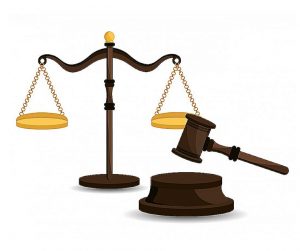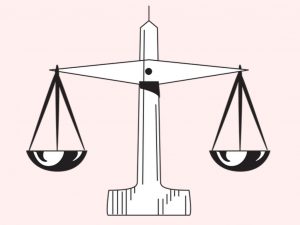Differences between criminal wrong and civil wrong: The federal republic of Nigeria is a country united in diversity. With different ethnicity cultures, as well as Rules and laws guiding the conduct of its’ vast population. Nigeria is a country unevenly divided into four different regions (Eastern, Western, Northern and Southern Regions) with a united 36 States and the Federal Capital Territory. The prevalent laws operational in Nigeria are the Nigerian constitution, the sharia law in the northern Nigeria also known as the Penal Code and the Criminal Code operational in the Southern Nigeria.

It is imperative to point out vividly that the Nigerian constitution reigns Supreme over every other extant law in the country as contained in its’ first chapter (S.1 (3) of the 1999 Constitution of the federal republic of Nigeria as amended).
Although, these are not the only enactments operational in Nigeria as there are other laws prescribing appropriate human relations and social conducts. In a nutshell, the summation of the extant laws in Nigeria can be clearly categorized into two. These categories are; Criminal and Civil Laws.

The criminal laws are laws regulating acts considered as crime to the society while the civil laws are laws that regulate the social interaction of citizens such as how they enter into business arrangements, their duties to their fellow human being and other trust obligations. The above laws control human behavior and ways of interacting with one another as well as ways of interacting with the government. A clear violation of any of the provisions of these laws is considered a wrongful act and comes with it consequences.
However, the consequences and its’ ways of enforcement is quite interesting and also different. In this article, we will be looking at the difference between civil wrong and criminal offences.
Recommended: Most Complex Movies of All Time
Differences Between Civil and Criminal Offences
Civil and criminal offencess are predominantly similar among countries practicing similar legal system like Nigeria and Britain however, this article considers Nigeria as a case study.
Below are some of the differentiating elements of civil and criminal offences:
1. A civil wrong is a wrong committed against a fellow individual or organization which often takes the form of reneging or breaching an agreement or violation of fundamental rights and obligation such as, breach of contract agreement, breach of trust, or a tortuous act. Criminal offences on the other hand is a wrong against the State.

Though not in the literal sense of it, but it is a wrong that the State considers to be offensive (even though it might have been done against a citizen, the nature of the Act makes it a wrong against the public/State) in line with its’ mandate under the second chapter of the constitution to secure the life and properties of citizens. A clear example of such wrong is the killing (murder or manslaughter) if another person, rubbery, arson, terrorism etc.
Also see: Advantages and Disadvantages of Delegated Legislation
2. A civil wrong gives rise to a civil action and can be instituted in court by the aggrieved party. This means that an individual can institute an action for a civil wrong. It is clearly a different card when it comes to Criminal offences.
Criminal offences gives rise to a criminal action which can only be instituted by the State through the Attorney General of the Federation or State. In few circumstances, an exception to this rule is observed but with clear and explicit condition.
3. Due to the nature of civil wrongs, there are no punishment meted out to the defaulter. The real intent for a civil action is not to punish the defaulter but to restore the aggrieved party to its original position before the breach or make good what has been lost as a result of the wrong. Consequence of a civil wrong is usually remedies or compensation for such wrong.
This is usually to placate the dissatisfaction of the party that was wronged. This compensation or remedies could either be monetary or performance of a specified duty in compliance with the civil agreement between the parties involved. It is clearly different when it comes to criminal offences and action. The motive for a criminal action is usually to met out punishment to the offender as a way of correction and deterrent to others.

Recommended: Easiest Programming Languages to Learn in 2022
4. The parties to a civil action are referred differently from those in a criminal action. Parties to a civil action are referred to as plaintiff/respondent, complainant/Respondent, and Petitioner/Respondent as the case may be. In a criminal action, the parties are referred to as plaintiff/defendant, Prosecution/Defendant as the case may be.
It is also worthy of mention that, a person arrested for Criminal offences is called a suspect and if found to have actually committed the offences, he is labelled as being guilty, and subsequently convicted which further labels him or her as an ex-convict. None of these terminologies are applicable to a civil action.
5. A party that has been found to be at fault in a civil action is made to compensate the aggrieved party and not punished with either prison sentence or death. He or she is allowed to make good the situation and not jailed. Making good the situation takes different form as would be justly prescribed by a court of law.
However, a party that commits Criminal offences is usually arrested and charged to court by the State law enforcement agency and, if count guilty, will be punished in accordance with the criminal law. Such punishment comes in form of imprisonment, community service, death sentence etc.
Recommended: Countries with the Most Beautiful Women in the world
6. The laws regulating civil wrongs are quite different. For instance, in Nigeria, we have such civil Laws to include, the law of tort, contract laws of different States etc and notably, they have no punishments prescribed in them. On the other hand, criminal offencess are regulated by criminal laws. The prevalent laws regulating criminal offences in Nigeria includes, the Criminal Code Act operating in Southern Nigeria, the Penal Code of Northern Nigeria, the Economic and Financial Crimes Commission Act, the Fire Arms Act, the Nigerian Drug Law Enforcement Act, the Terrorism Act, the Cyber Crimes Act etc.
All of these acts are operational in Nigeria and each of them prescribes what a wrongful act is, its’ elements and punishments in line with the provisions of Section 36 Subsection 12 of the 1999 Constitution of the Federal Republic of Nigeria as Amended. That section provides that no person shall be punished for an offences except such offence is defined and punishments prescribed in a written law.
7. Civil cases can be conducted outside a court of law by mediators and conciliators and their conclusive decisions are binding on the parties involved, however, only a court of competent jurisdiction can try a Criminal case to a conclusive end and pass it judgment on the offender and such judgment binds the offender.

Also see: Best Police Force In The World 2022
8. A civil action may be allowed to proceed in the absence of any other the party being in court but it is not the case in a criminal action.
The parties to a criminal action are required to be in court during trial in compliance with the constitutional provision on fair trial under Chapter 4 of the Constitution.
9. In a civil action, the Respondent is not required to take a plea of guilty or not guilty. It is not the practice and not obtainable in civil proceedings. The reverse is the case in criminal actions.
In Criminal proceedings, the accused is required to take a plea of guilty or not guilty for the trial to commence.
10. Predominantly, the mode of commencing a civil action is by Claims and that makes the party instituting the action the Claimant. In a criminal proceedings, the predominant mode of commencing the action is by charge(s).
Also see: Countries with the best justice system in the world
In summary, the difference between a civil wrong and a criminal offence(s) does primarily lie in the act committed but in the mode of commencing the action, the parties to the action, the nature of the proceeding, the motive for instituting the proceeding and the consequences of such proceeding.

Edeh Samuel Chukwuemeka, ACMC, is a lawyer and a certified mediator/conciliator in Nigeria. He is also a developer with knowledge in various programming languages. Samuel is determined to leverage his skills in technology, SEO, and legal practice to revolutionize the legal profession worldwide by creating web and mobile applications that simplify legal research. Sam is also passionate about educating and providing valuable information to people.